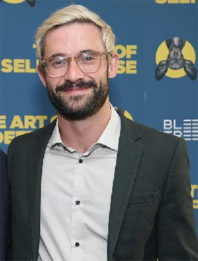
There’s something special about getting to express a certain catharsis that isn’t necessarily talked about enough.
In The Art of Self-Defense we come to timid bookkeeper Casey (Jesse Eisenberg) joins a neighborhood karate studio to learn how to protect himself after he’s attacked by a roving motorcycle gang. Under the watchful eye of a charismatic instructor, Sensei (Alessandro Nivola), and hardcore brown belt Anna (Imogen Poots), Casey gains a newfound sense of confidence for the first time in his life. But when he attends Sensei’s mysterious night classes, he discovers a sinister world of fraternity, brutality and hyper-masculinity, presenting a journey that places him squarely in the sights of his enigmatic new mentor.
For decades there has been a perception of how men are ‘supposed’ to be like, especially when they are around other men and how the definition of being masculine got perverted into some abusive nonsense. It’s not something that has ever really been talked about until recent years as the phrase ‘toxic masculinity’ has come to the forefront and it’s never really effectively been mocked on the big screen… until now.
With The Art of Self-Defense in theatres now I got the unique pleasure to sit and talk with writer/director Riley Stearns about the inspiration of the film, how it sets us up for some genuine surprises and a very unique emotional ride and how we can laugh at some truly uncomfortable stuff as we get to see what the toxicity of what the perception of male behaviour is perceived to be and actually is; Ridiculous bullshit.
Warning for some light spoilers…
Dave Voigt: Obviously congratulations on the movie?
Riley Stearns: Oh thank you…
And you know I was really struck by it because quite frankly I didn’t expect to be quite as dark…
(Laughs) Yeah we wanted the trailer to set you up thinking one thing but then going in the other direction, I’m really glad you felt that way.
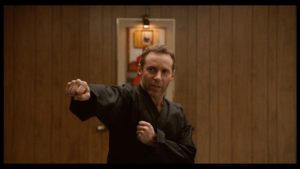 What was the spark for you to go down this road and tell this tale of toxic masculinity and everything that surrounds it?
What was the spark for you to go down this road and tell this tale of toxic masculinity and everything that surrounds it?
It’s funny because I actually wrote this around the end of 2015 and that term of ‘Toxic Masculinity’ may have been in some people’s lexicons but it certainly wasn’t in mine. It wasn’t so much about me tackling what ‘men’ are thinking but rather it was about coming around to dealing with what I was thinking about. At that time, my personal thoughts and feelings we’re really centered around the fact that I didn’t feel like a “man” or what the mainstream was telling I was supposed to feel like as a “man”, and I had real anxiety about the overall expectations on men and manhood as a whole and the things that people would do to try and fit in and belong when they just never felt like they have. Those we’re the kind of ideas that I wanted to explore but at the same time setting most of the action in this pseudo martial arts studio really felt interesting to me, even though it really isn’t a “martial arts” film. I was also pretty confident that I’d be able to subvert people’s expectations going into the film as well.
You almost could have centered the entire film around the break room scenes, but it allows it all to go so much deeper…
(Laughs) Yeah I really felt like anywhere you interact with other men you can set up a scene in that kind of space. Having our lead character (Jesse Eisenberg) in the work place in this menial job as an accountant which he’s actually pretty good at and just have these conversations where there are no women or any kind of authority figures around, listening to what they would say and just going very literal and as overt as we possibly could with it all. That’s what was funny and effective to me.
And that’s really the power of the comedy in this film because we laugh but still need that beat or moment to process some of the lines that were actually said.
And that was how we had to play it on set, because if we tried to deliver some of these lines as a joke with a wink and a nod to the camera then it just wouldn’t have worked, but if you say this heightened horrible thing to someone like you believe it to your core, that’s where the awkward but genuine comedy in it all comes in. There was always a lot of playing with lines on set to determine if something was too much or too little, we always had to find that exact spot to make it hit home.
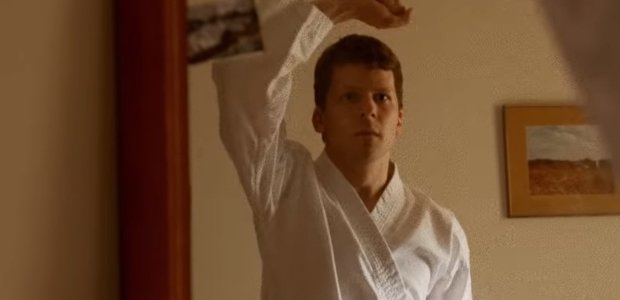
I’ve got to imagine that as a director this was probably the kind of project where you needed to give your actors a lot of rope and leeway, especially since you undoubtedly had plenty of takes with people just bursting at the seams laughing.
You know it’s funny because I actually feel like I gave them all very little rope because I really knew exactly what we needed. It was a bonus being the writer on this as well because I knew what was needed for every line of dialogue in the film which allowed me to be very exact, especially with all the voices in my head (laughs). But also there would be times when you’d hear a line spoken and there was just a different meaning to it that you really didn’t pick up on while writing but when you’re there in the moment it’s a lot easier to see.
It was important for everyone to keep a straight face during the takes, but obviously the second I would yell cut we would just burst into hysterics and it felt like such a release because the stress of keeping a straight face through some of these moments was a big task.
It’s interesting because obviously you wrote it, you directed it but it is something that is inherently so deadpan funny yet serious at the same time and even as an audience member you have this natural instinct to guffaw and laugh but even we have to keep it in check to see how those around us will react. I’m curious to hear how you found it as a director to really rein all these elements in because I can imagine it’s probably something that looks simpler on paper then it does in practice.
Yeah…I mean so much of it comes down to trust. The actors have to trust me and I have to trust them. My producers have to have faith in me because I’m sure they’re we’re things that they may not have understood but they had faith in me to get it done. It’s all such a tricky balance really for the entire team working on it all and I always have my eye on it. However when it comes down to it for me I think it was just important that I trusted my gut and it’s always easier on the day to say to an actor “Listen, can we try it one more time but a little differently” then seeing something in the edit and knowing that I didn’t push them hard enough on the day and get exactly what I wanted and now I am forced to work with something that just isn’t quite there. I’d always try and do as much as could on the day, even if it made an actor uncomfortable and they weren’t necessarily feeling it but at least I knew that I’d have it for later on, in case I needed it. It’s really about understanding in the moment, what do I need and how can I get it?
Like you said about the trailer; it teases us going one way but we really go to another extreme in it all. Can you talk a little about your choices for casting because now after seeing it, it’s the kind of film that you’d have a genuinely hard time picturing anyone else in the roles, did you write this with people in mind?
It’s fun when you can say that about and actor and I definitely feel that way about Jesse, Alessandro and Imogen but to be honest I really try not to write with people in mind. Ultimately as a younger filmmaker if there’s someone you think is perfect for a role and you try and write with them in mind…and then you can’t get them to sign on to do the role…you’re kind of screwed (Laughs) I would rather write these characters as faceless as I can and then get to casting being open to any and all ideas. Jesse came about because we’re at the same agency and at one point they recommended him to me and I was genuinely surprised. “You think we can get Jesse Eisenberg?” He’s the articulate and really intelligent guy, and pairing him with this weird little karate movie didn’t really feel like it was possible, but he read it over a long weekend and messaged me back on the Tuesday saying that he wanted to do it and really appreciated me thinking of him. We made it work which is just really cool!
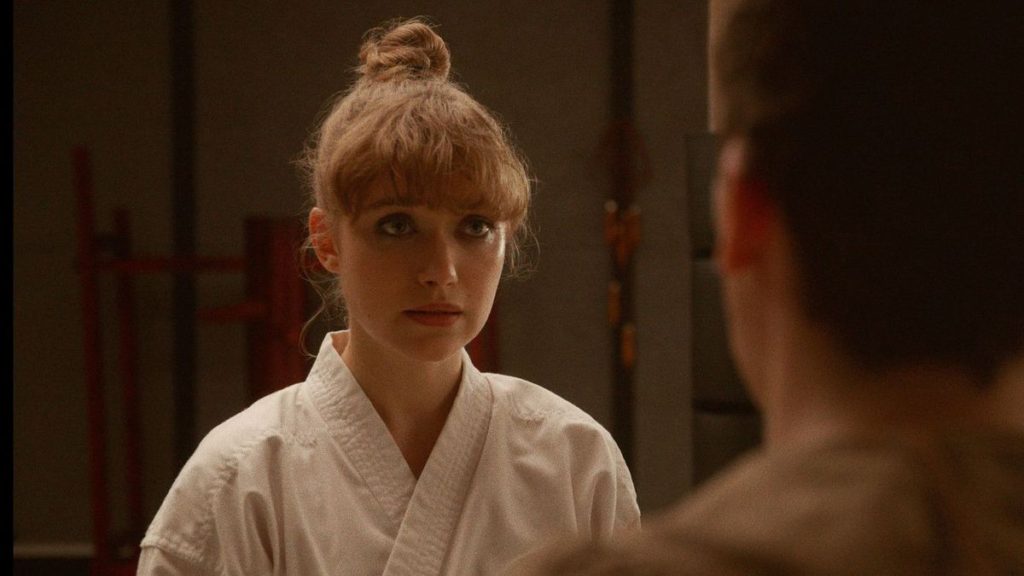
There’s such an emotional and practical intelligence to the film as well because there we’re some scenes; particularly when Jesse finally sees the equipment room. As much as we’re supposed to be surprised with what we see, because of how it all unfolds we’re really not all that surprised at all.
The funny thing to me is that no one ever questions the equipment room and the contents there in and I’m really fascinated in the fact that buildings can really have as much history and character as we do as people. I loved the idea that he found this random place, that probably was a funeral home at one time and he just turned it into his martial arts dojo. We wanted these subtlety weird little elements to be present throughout the building, from the awkwardly placed carpet in the hallways to the sconces with a really unique color palette. At that point in the movie, no one is really questioning everything but I knew that I wanted to have answers for it to make it feel like there was purpose to it all.
The entire experience of this film really has this sense of catharsis to it…
(LAUGHS)
NO SERIOUSLY…because we are obviously empathizing with Jesse’s character who has gone through this traumatic experience and trying to find a way to channel his aggression and emotions because of it while slowly but surely finding out that he’s in bed with this psychopath of a ‘Sensei’ at the same time!
I loved that you used the word ‘catharsis’ because from the very beginning I wanted this to be a story that had a very clear cut ending. There had to be closure, just maybe not in the way that audiences may have expected and even if you see some of the twists coming in the film but you just never know how you’re going to feel when the story gets you there. That was always important to me, sure this is a heightened world that we are in, but it was important to feel for Casey and see the human element of it all. That really was the intention of the entire thing.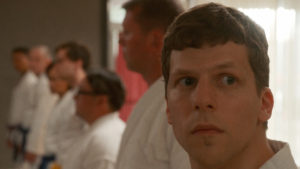
Were you every concerned that maybe things were just getting a little too dark?
(Laughs) Never on my end, but behind the scenes I definitely had people helping me steer the ship and everyone was behind me in making the film I wanted to make. Sure there were some of the scenes of violence where we had the most back and forth going on because we did want to push some limits and shock you but never just for the sake of doing it and it always had to have some purpose to it.
There’s always one scene, whenever I get to see the film in a theatre that always gets a very visceral reaction which surprises me but it’s the fight scene with the fire hydrant and people react to that as incredibly brutal. I guess ultimately because I was there when we shot it and the stunt performer knew exactly how to do it and it wasn’t dangerous. I never wanted to shy away from the violence because it’s a movie about men and men’s culture and this is a huge part of that.
Plus the whole thing really does twist it all on its ear as well because the moment with the dog getting it’s revenge was one of those release kind of moments that you shouldn’t REALLY be laughing at but are getting incredible enjoyment out of.
(Laughs) I appreciate that man, and yeah having a dog be able to get vengeance for another dog is a classic moment and I was so happy it worked as well as it did.
Now that it’s out there in the universe, how are you finding audience reactions?
Seeing it now connect with larger audiences it’s cool to see how people are genuinely digging it. Even if it isn’t totally there thing, people are appreciating how the film is trying to push boundaries and buttons a little bit to get the conversation about how Men should be moving in the right direction. Plus I’m pleasantly surprised that it’s not nearly as divisive as I expected it to be and people are relating to it. But at the end of the day it’s about my perspective as a lower middle class white man and what society’s expectations of my man hood were supposed to be. People are relating to it across the board and that has been so cool.
And that’s the genuine magic of it all because while it does have this dead pan hilarity throughout but it shines a real light on the nature of toxic masculinity and what bullshit it really is.
Thanks so much man, it means a lot.

